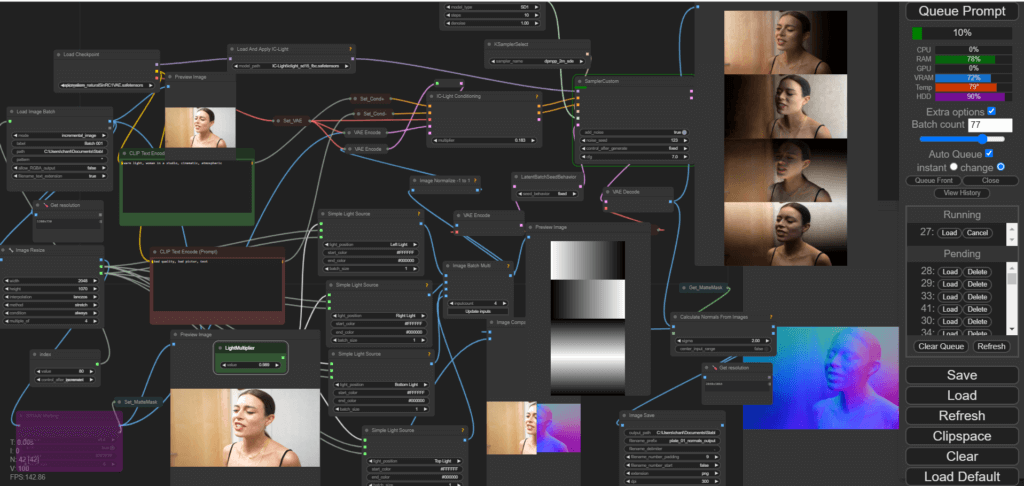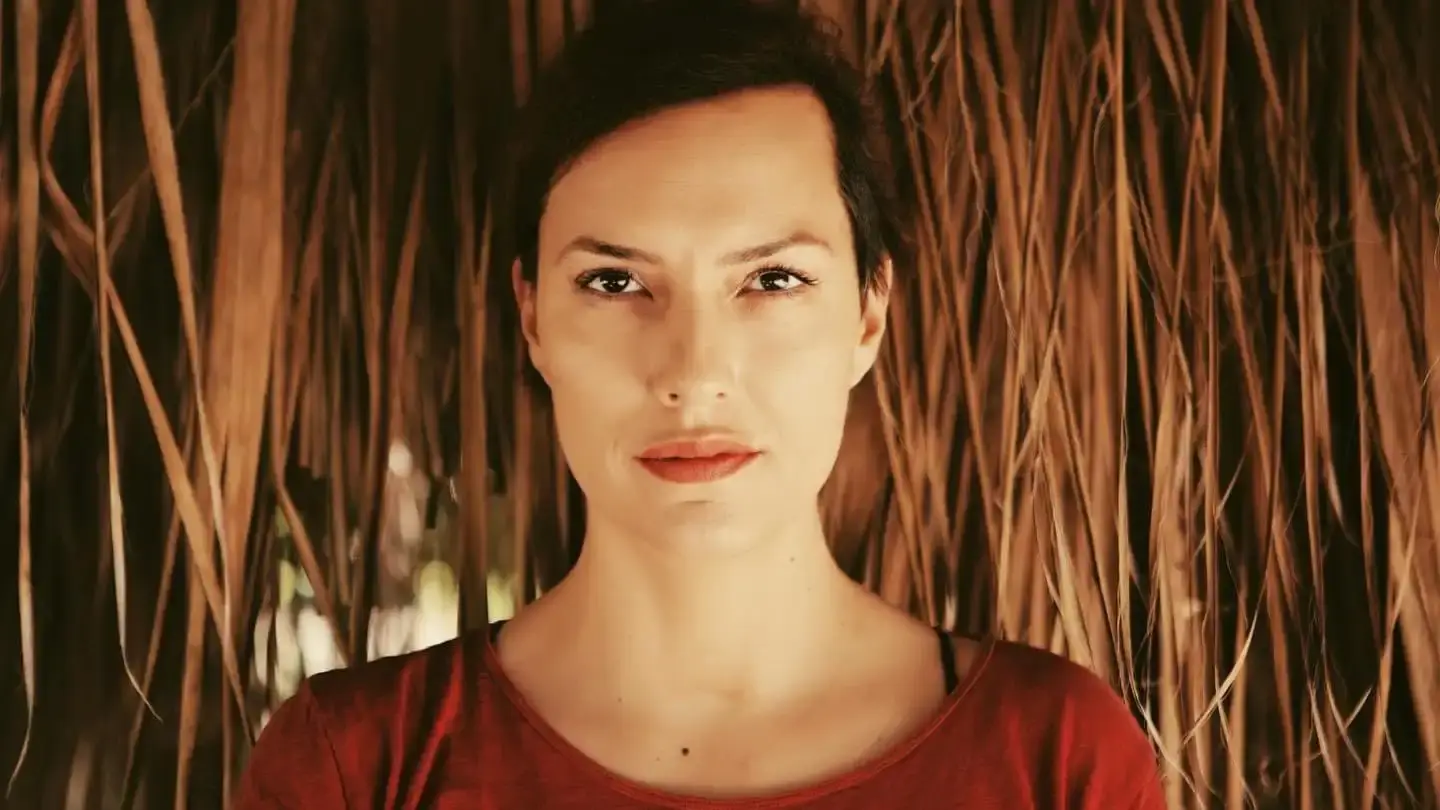By Natali Chavez, Research Scholar, Narrative Group, ICT
Natali Chavez is a director, actor, and voiceover artist, who joined ICT as a Research Scholar in the Narrative Group at ICT this summer. This is an internship as part of her PhD studies (Acting, Virtual Reality and Artificial Intelligence) at the Aristotle University of Thessaloniki (AUTH). In this essay, part of our series to celebrate ICT 25, Chavez talks about coming to the USA, her experience at ICT working on the Acting and Interacting in Generated Worlds – and what it was like making her first movie in Los Angeles!
ICT’s Intern Program
I discovered ICT’s Intern Program while making my “research” around ICT. Everything started by reading papers about the Light Stage when I was writing my first paper. A citation to its creator Paul Debevec and an overview of his accomplishments led me to ICT’s website. Amazed by how many labs apply to my scientific interests, I wanted to find a way to join this institute. One of the ways was to apply for a Fulbright Grant. For that besides others I needed an invitation letter from an US institution. It was very kind of Dr Gratch to forward my research proposal to David Nelson who proved to be really interested in it. We met (virtually -1am greek time :P) with David who after us having a really nice talk, invited me officially to join the MxR lab upon my selection from the Fulbright Foundation. In the meantime I wanted to raise the possibilities working in ICT and that’s when I ran on ICT’s Summer Internships and specifically on a call from Dr. Andrew Grodon and the Interactive Narrative Research that was a fit to my interdisciplinary research: Acting and Interacting in Generated Worlds. I got selected and here I am. ICT’s Intern Program is a brilliant opportunity for new researchers. ICT has great facilities but the most fascinating thing here is the people. Everyone is open to collaborate, to help, to teach and to learn. I am very happy I joined the interactive narratives research as I deeply believe in the power of storytelling. For the record, I also got the Fulbright Grant so from November I will be here again for six months conducting my research on emotion-wise expressive Virtual Actors in the MxR lab surrounded and supported by a unique team.
Internship days
During my internship I had the opportunity to interact and hangout with interns from different universities, countries and backgrounds but also had really inspiring meetings with professors and staff from ICT. I also really enjoyed AWE, LA river’s lab, ICT TechTalks, Intern’s seminars and presentations (including mine :p). Mentionable is ICT’s love of spoiling foodies (My welcome lunch from Andrew and members of other labs, Taco Tuesdays, ICT Family Day, Ice-Cream Thursdays, International Potluck (thank you Rose for the extra treat ), Lab Lunch-out with MxR lab etc.). Another amazing experience and a dream that came true was for me to perform as an actress and get scanned in the Light Stage and to be able to have access to my Virtual Me for the needs of my research and the same time to offer my performance for the scientific needs of the Visual and Graphics Lab and its inspiring team. Of course I had the opportunity on my weekends mostly to discover the city of stars aka Los Angeles. Besides biking (thank you ICT for lending the bike), hiking, eating, visiting museums and theaters, in LA my favorite thing is surfing (thank you D.Nelson for lending the surfboard). But above all, along with my advisor Dr. Gordon, we well organized our workflows that we were about to follow to get our results regarding his vision about an open source post production solution for emerging filmmakers. The whole project is based on Dr. Gordon’s AI assisted virtual production technique, Camera Aligned Material Planes.
The CAMP project and my first Short Movie

This solution actually aspires to automate a pipeline through which a filmmaker can process his film that has been filmed with basic lighting, just in an indoor space, with a boom and a decent camera or even a smartphone. This pipeline utilizes Artificial Intelligence tools and post production’s free tools to elaborate film’s frames, relight them, change backgrounds, add virtual objects etc. That way a low budget production won’t jeopardize filmmakers’ vision regarding their film’s quality.
But to get to this point is needed to recruit their filming crew. Through my and my advisor’s LA connections, we formed our team(of volunteers). Three actors(including me), a directing consultant, a writing consultant, audio operator, a young cinematographer-USC alumni-camera operator, another intern as production’s assistant and remotely a music composer and a performer from Greece. The filming took place mostly in ICT’s sound studio and… my kitchen.
The script was written by me and has to do with time, relations and existence. Its title: “ Can I have a minute? “. Another challenge for me is to prove that AI and technology in general can be utilized to create a grounded and human story. Now we are in a post production fever. Actually we test the workflows we created and are still creating. So far we have our Stable Diffusion results that are really good, the film is traditionally edited by me, the music score is ready, and now both Dr. Gordon and I are experimenting with the Blender environment.
I am very excited about our project as it was my very first short film( also made in LA! ) as a writer, casting director, director, editor and executive producer but most of all because I really believe that will offer a crucial first stepping stone to the filmmakers of the future.
Future plans and ICT influence
Referring to our project my future plans are to complete it at first, screen it in both ICT and USC Cinematics, and in Films and AI films festivals, to publish a paper, submit for Siggraph 2025 Electronic Theater section and finally to manage getting funding for further research and development.
The good and at the same time bad thing that happened here in ICT is that I got in a welcoming, supporting and pioneering workplace that something less would feel like a back step. I am really lucky and honored that as a Fulbrighter I will continue conducting my research here until next May. Beside others, I will try to classify brain waves to emotions and apply, through AI techniques, the derived data to a virtual actor. This will require experimentation with EEG on an actual actor’s real time performance and its goal is the creation of a virtual actor useful in cognitive sciences. After that I plan to go back to Athens to my husband and my dog and complete my dissertation with the results that I will obtain from my work here. I say it here to commit: I aspire to defend my PhD by the end of next year.
A moment to treasure
There are so many once in a lifetime experiences I had here. If i have to choose just one, that would be the film itself as it is based on a recent very personal loss. This was a big challenge for me while having to deal with that almost 24/7 through conceiving the idea, filming, acting and editing some fragile moments but mostly that worked in a soothing way. As art always does.
Bio
Natali Chavez is a professional actress and a Ph.D. candidate in the Film Department of the School of Fine Arts at Aristotle University of Thessaloniki, in the field of Virtual, Augmented, Mixed Reality and Cinema. She obtained a B.A. in European and International Business and Politics from the University of Macedonia, a M.Sc. in Services Management at Athens University of Economics and Business, and an Acting Diploma. She also possesses certificates, inter alia, in Pedagogy and Teaching, Artificial Intelligence, Python and Machine Learning. As an actress she has worked with various important theatrical and film directors. Her research interests lie in Virtual Actors and their expressions using anthropological, cognitive and acting theories, animation, Virtual Reality and Artificial Intelligence tools.
Currently she is completing her ICT Summer Internship under Dr. Andrew Gordon from Interactive Narrative Research. The result of this internship leads to a new solution for emerging filmmakers which, by taking advantage of AI workflows, offers high level quality results in lighting, scene designing etc.
As a Fulbright Visiting Research Student, she will join the Mixed Reality Lab for 6 months. Her main scientific aim will be a theoretical and an experimental study of acting methods translation into meaningful data in scope of creation of a virtual actor with Artificial Intelligence component and its application in cognitive sciences.
